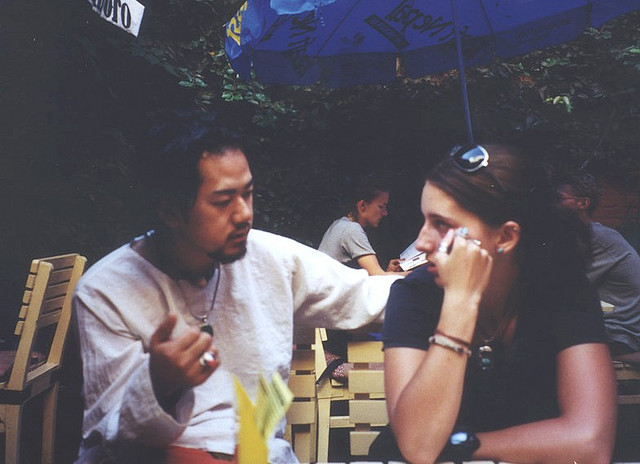
“Why do you look at the speck that is in your brother’s eye, but do not notice the log that is in your own eye?” ~ Matthew 7:3
Blame has become the latest trend in our relationships.
An abundant degree of blaming is present in the way we deal with our families, coworkers, friends and romantic partners.
Blaming knows no boundaries.
We can blame someone for doing something really silly (like leaving the toothpaste open) or we can blame them for doing something major like lying to us or cheating on us.
Everyone has been there. We’ve all been blamed and we certainly have blamed other people. I can say that blaming and being blamed both generate unwanted and arduous feelings.
I’ve come to unravel the true nature of blaming. Blame is extremely unconscious and it stems from the lack of awareness of our ego.
To become aware of this particular behavior, however, we must have an honest conversation with ourselves.
I’ve had this conversation plenty of times before, and I still do whenever I feel like I’m on the verge of blaming someone. And although we may not find the answers to be pleasant, they will most certainly help us to drop the mask we’ve been wearing.
Unfortunately, we more often wear that mask with the people we love the most, especially with our families and our romantic relationships.
But why do we blame them?
What is it exactly that transforms us from conscious beings to void persons who resort to blaming?
Having been there and done that in the past, I believe that we blame other people because it’s easy.
Yes. Blaming is easy.
It is easier to point a finger at someone else, than to do so at ourselves. We all remember when we were kids and when we were part of an accident. When adults asked us “Who did this?”, every child in the room, pointed the finger at the other and said, “They did it!”
Most of the time we blame the other person for doing us wrong, thoroughly dismissing where we may have went wrong ourselves. We are beings who consistently fear looking inward because we fear beholding our imperfections. We hold a strong aversion towards seeing our own flaws and accepting them.
And so, instead of looking at our own involvement in the problem, we hold the other fully responsible of whatever went awry. Blaming others simply drifts us away from feeling guilt and it saves us a good deal of effort.
It is an unconscious attempt at hiding our own bad behaviors.
Let’s take an example of the latest relationship we were in or the one we are in now. Maybe we blame our partner for not listening to us or for not giving us any attention. We see the flaws in our partner but we don’t see the flaws in ourselves, that perhaps have led our partner to not listening to us.
In other times, we blame other people because we opt to make it look as if we are right and the other person is wrong or we are perfect and the other person isn’t. This particular behavior will strengthen our own self-victimization.
I came to notice that it is very easy to blame others for our own unhappiness, contributing further to our emotional suffering.
We think that if we make the other person feel guilty, we are basically punishing him and thus, he will change.
Blaming is never about the other person solely. Blaming is highly related to our own actions and feelings. As long as we haven’t yet worked on loving ourselves and making peace with our past and our flaws, we will never be able to cut the chains of blaming.
We need to practice understanding others so we can forgive and refrain from blaming. When I was in India last year, I attended a Dharma talk with a Buddhist monk who said something very powerful that resonated with me.
He said, “Forgive others. Don’t blame them. Whatever they did to you in the past, it is all they knew back then. And whatever you did to them, it is all you knew. This is how much you both knew.”
Personally, I let go of blaming certain people who crossed my path when I thought about it this way. They did me wrong, I did them wrong, I blamed them, they blamed me, but this is all we knew at that moment. We didn’t know how to behave or how to react back then and it’s okay. When we understand why we and others behave in certain ways, we can open a portal of communication and compassion towards each other.
Also, we should know that every problem or every failed relationship never comes from one side. We should take responsibility for our own wrongdoings too. Although from the outside it might feel uncanny to hold ourselves responsible, the truth is we will feel an unparalleled sense of relief when we know that we were part of the problem as well. We should never be scared of admitting that sometimes and in some cases we have helped with creating that particular problem.
Furthermore, we can actually use blaming as a stepping stone to help us conceptualize our character and actions. Whenever we blame someone else, we can directly reflect on our own actions too and thus realize that all is interdependent. We can learn from our own mistakes and others.
Let’s remember that blaming only keeps us hooked to problems. It is a burden that never did anyone any good.
Let’s take it off our shoulders for a happier, more peaceful life.
~
Author: Elyane Youssef
Editor: Caitlin Oriel
Image: Heather Thorkelson/Flickr











Read 0 comments and reply